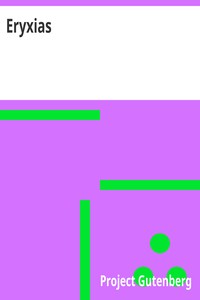Eryxias by Plato
"Eryxias by Plato" is a philosophical dialogue attributed to a later Platonic imitator, written during the period of the Hellenistic era. This work falls under the category of philosophical discourse, focusing on topics such as wealth, virtue, and the nature of human happiness. The dialogue is notable for its exploration of concepts that resonate with modern political economy, presenting an early examination of wealth's role and implications in human life. In "Eryxias,"
the characters Socrates, Eryxias, Critias, and Erasistratus engage in a discussion primarily centered around the nature of wealth and its relationship to virtue and happiness. The conversation unfolds in a series of interrogations led by Socrates, challenging the notion that wealth equates to true richness or happiness. Through various arguments, the participants examine whether wealth is inherently good or evil, considering the effects of poverty and richness on moral character and life satisfaction. Ultimately, Socrates guides the dialogue towards the conclusion that the wisest individuals, those who possess true knowledge, are actually the real wealth holders, as this wisdom transcends material wealth and leads to a more fulfilling life. (This is an automatically generated summary.)
Read or download for free
| How to read | Url | Size | |||
|---|---|---|---|---|---|
| Read now! | https://www.gutenberg.org/ebooks/1681.html.images | 71 kB | |||
| EPUB3 (E-readers incl. Send-to-Kindle) | https://www.gutenberg.org/ebooks/1681.epub3.images | 75 kB | |||
| EPUB (older E-readers) | https://www.gutenberg.org/ebooks/1681.epub.images | 74 kB | |||
| Kindle | https://www.gutenberg.org/ebooks/1681.kf8.images | 119 kB | |||
| older Kindles | https://www.gutenberg.org/ebooks/1681.kindle.images | 111 kB | |||
| Plain Text UTF-8 | https://www.gutenberg.org/ebooks/1681.txt.utf-8 | 58 kB | |||
| Download HTML (zip) | https://www.gutenberg.org/cache/epub/1681/pg1681-h.zip | 72 kB | |||
| There may be more files related to this item. | |||||
Similar Books
About this eBook
| Author | Plato (spurious and doubtful works), 428? BCE-348? BCE |
|---|---|
| Translator | Jowett, Benjamin, 1817-1893 |
| Title | Eryxias |
| Note | Reading ease score: 72.5 (7th grade). Fairly easy to read. |
| Note | Wikipedia page about this book: https://en.wikipedia.org/wiki/Eryxias_(dialogue) |
| Note | Socrates |
| Credits | Produced by Sue Asscher, and David Widger |
| Language | English |
| LoC Class | PA: Language and Literatures: Classical Languages and Literature |
| Subject | Classical literature |
| Subject | Philosophy, Ancient |
| Subject | Wealth -- Moral and ethical aspects |
| Subject | Virtue |
| Category | Text |
| EBook-No. | 1681 |
| Release Date | Mar 1, 1999 |
| Most Recently Updated | Jan 16, 2013 |
| Copyright Status | Public domain in the USA. |
| Downloads | 198 downloads in the last 30 days. |
| Project Gutenberg eBooks are always free! | |


